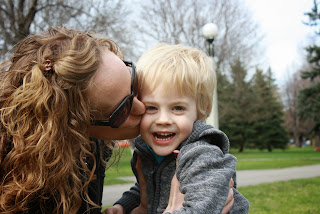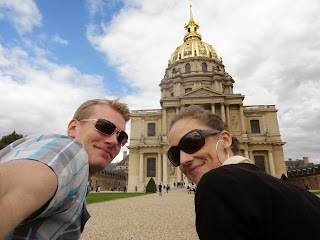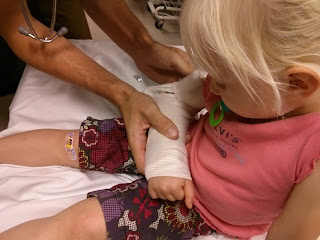 |
| May 2011. Ten months pre-diagnosis (and eight months pregnant). |
“Yes, they get very scared.”
“Then why do we call them brave?”
“Because, honey, brave people get very scared, and then they
do it anyway.”
Last October, I was celebrating one hundred days post-transplant.
My hair had only just started to grow back. Peach fuzz. I was still wearing a wig and I had no eyebrows. I was a skeletal waif, shuffling along
the river paths, and I could barely do one push-up. I could “run” for about
fifteen minutes, tops.
Fast-forward a year. My two-year-old daughter talks like a
three-year-old diva, my son is in kindergarten, I have re-defined my
professional goals, I have gained nearly 10 pounds of muscle, and I am now
training for a triathlon.
Am I scared? Yes. Will I still do it? Yes.
I’m also scared that I won’t be able to raise the funds I’ve
committed to raising for the Leukemia and Lymphoma Society. Sure it's scary. But is it cancer? No. So I'm doing it anyway.
Because someone has to.
Let me clarify. When I was in the hospital, being told I had
a low chance of survival, being told that the treatment would permanently
damage my lungs and possibly my heart, being told that I would never be fast
again, I spent hours on the Internet, searching for someone who had defied the
odds. I wanted a story of an athlete who had received a bone marrow transplant,
but was still able to return to the life he or she had before. I found a lot of
BMT survivor stories about chronic illnesses, repeated hospital admissions,
kidney, liver and lung damage, permanent disabilities…the lists went on. These people
were alive, which was a relief, but competing in athletics? Definitely not.
I was terrified. I needed to be active. I could not
comprehend the idea of being sick and disabled for the rest of my life, or even
for the next few years. I needed to find a story of someone who had a BMT and
returned to competition, someone who got back to the level of training they had
before, or perhaps even better. Someone who overcame the fairly discouraging
odds. But I couldn’t find it. (Ok, I know you’re going to say Lance Armstrong,
but I’m talking about a regular person,
not a famous/infamous professional athlete. I read his book in the hospital and
was inspired that someone could go through all that and rebuild himself and
compete again. His story is amazing and gave me hope. Without venturing into
the drug allegations melee, Lance has undoubtedly inspired many people
struggling with cancer – myself included – but it is a bit hard to relate to
someone at world champion level. I will never be a professional athlete. I just
wanted an everyman/woman story. Plus, he didn’t have a bone marrow transplant.
Just saying.)
So now I am that story that I couldn’t find. Or at least I
want to be.
 |
| April 2012. One month post-diagnosis. Think a triathlon is hard? No. THIS is hard. |
I invite you all on this visualization exercise with me.
Imagine you are a fit, athletic person in your early thirties. You have never
smoked, you eat ridiculously healthy food, you are careful about avoiding
toxins in your products. Women, imagine that you have a seven-month-old infant
and have just worked to get yourself back into shape after pregnancy. That
infant is not sleeping. Ever. You are sleep deprived but running every day
anyway, because it’s important to you.
Now imagine that you don’t feel quite right on one of your
runs. Something is off. You go snowboarding and feel a little dizzy. You get
progressively sicker over the next few weeks. You try to run but can’t. You go
on antibiotics over and over again. Nothing works. You get blood tests, you get
a bone marrow biopsy, you get a broncoscopy, you get sicker. Finally you are
admitted to the hospital and they tell you: you have leukemia. Your life
explodes. You have to wean your breastfed daughter immediately. Your children
cannot visit your ward. You call your mom.
Then they tell you: you have a very aggressive leukemia.
Your chances of survival are not good (understatement). Without treatment, they
give you weeks to live. Weeks. You need
a bone marrow transplant right now. Your brother is not a match.
You have to explain to your three-year-old son what "cancer" means, and that mommy has it.
You have to explain to your three-year-old son what "cancer" means, and that mommy has it.
 |
| October 2012. Three months post-transplant. Hiking with the wig (and a sleeping baby) |
Now imagine that you survive months of daily vomiting and
severe pain and mouth ulcers. Crushing fatigue, anxiety and depression are
never far off. At some low points, you feel so awful that you just want to give
up and die. But you don’t. You rally. You force yourself to eat. You lose
twenty pounds and almost all of your hard-earned muscle. You are so tired you
can barely walk one hundred metres. But you do it anyway, because you read
somewhere that the more you move, the faster your lungs will recover.
A few months later, weak, skinny, but alive, you start running again. You will not lose this
fight. One minute on, one minute off – it’s a shuffle, without doubt. You do it
anyway. You go back into the gym to regain that lost muscle. You can’t even do
one full push-up. But you do push-ups anyway. Girly-style.
You look at your skinny self in the mirror and envision a
stronger you.
A few months after that, you can run a few kilometres.
Barely. You get pneumonia. You recover. A few months after that, you push yourself to run a full ten kilometres, in
the dead of winter. You get a vicious gastro illness and lose seven pounds. You
recover. Then, ten months after the doctors killed you with chemo and brought
you back to life, you are at the start line of a fourteen kilometre trail race.
And you actually beat some
people. You sob.
You are not quite back to where you were, but you’re close.
 |
| June 2013. Victory Lap. 12 months post-transplant, racing Emilie's Run 5k (time: 21:32). |
Now imagine setting a new, slightly crazy goal. A goal to
show people that you are not done yet. A goal to show cancer survivors, and
especially BMT survivors, what’s possible. A goal that will help others through
the same nightmare you just lived. You decide to try something you’ve never
done. Something that scares you. You decide to race harder and farther than
you’ve ever raced. To go somewhere you have only ever dreamed of racing.
Somewhere you never thought possible.
Now stop imagining. This is a true story. This is my story.
***
The crazy details:
I have signed up to race the Lavaman Olympic-distance triathlon
in Kona, Hawaii with Team in Training to raise money for the Leukemia &
Lymphoma Society of Canada. On March 30, 2014, I will race 51.5 kilometres (1.5km swim,
40km bike, and 10km run), farther than I have ever raced before (pre- or post-cancer).
If you want to help me achieve this dream and help find better cures and treatments for
blood cancers, please consider
donating to the cause here.
If you’re not sure how much to donate, consider $1 for each
of the 51.5km that I will race. Or just sponsor the bike leg (40km) or run leg
(10km). If you can’t afford that, you probably know someone who can. Please
pass it on. Spread the message far and wide to everyone you know. Anything helps.
If you cannot donate funds but still want to help, I am
looking for a few volunteers who could donate 1-2 hours a week to help me with
fundraising – you can live anywhere to do this. As my budget is very tight, I am also seeking donations of
new or used training gear (specifically: a bike [lend or donate], race goggles,
and tri shorts/top). Air miles donations are also welcome!
Contact: rachel@rachelschmidt.ca.

















